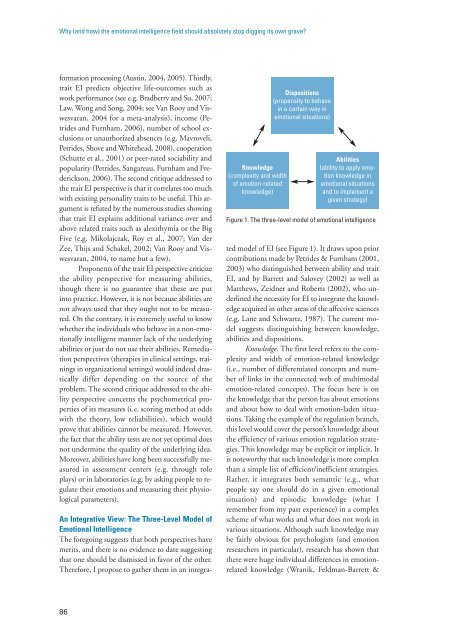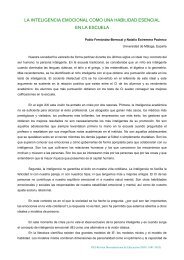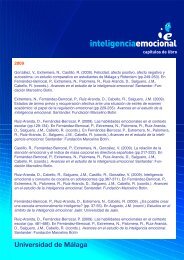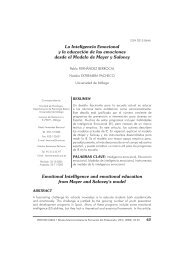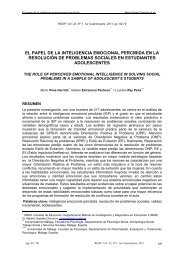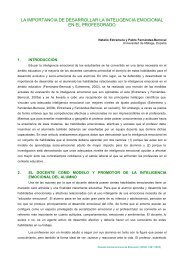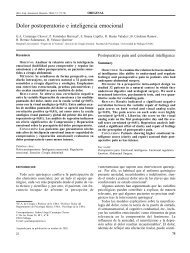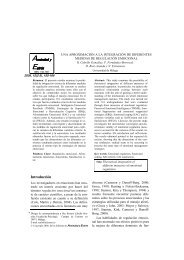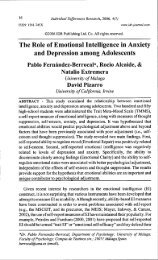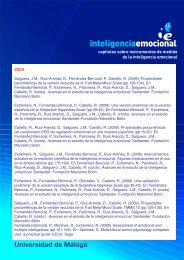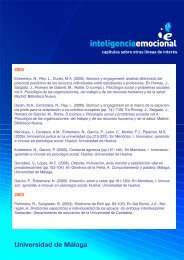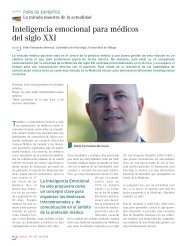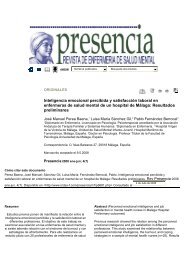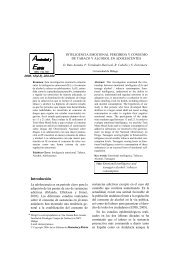Avances en el estudio de la Inteligencia Emocional
Avances en el estudio de la Inteligencia Emocional
Avances en el estudio de la Inteligencia Emocional
You also want an ePaper? Increase the reach of your titles
YUMPU automatically turns print PDFs into web optimized ePapers that Google loves.
Why (and how) the emotional int<strong>el</strong>lig<strong>en</strong>ce fi<strong>el</strong>d should absolut<strong>el</strong>y stop digging its own grave?<br />
formation processing (Austin, 2004, 2005). Thirdly,<br />
trait EI predicts objective life-outcomes such as<br />
work performance (see e.g. Bradberry and Su, 2007;<br />
Law, Wong and Song, 2004; see Van Rooy and Viswesvaran,<br />
2004 for a meta-analysis), income (Petri<strong>de</strong>s<br />
and Furnham, 2006), number of school exclusions<br />
or unauthorized abs<strong>en</strong>ces (e.g. Mavrov<strong>el</strong>i,<br />
Petri<strong>de</strong>s, Shove and Whitehead, 2008), cooperation<br />
(Schutte et al., 2001) or peer-rated sociability and<br />
popu<strong>la</strong>rity (Petri<strong>de</strong>s, Sangareau, Furnham and Fre<strong>de</strong>rickson,<br />
2006). The second critique addressed to<br />
the trait EI perspective is that it corr<strong>el</strong>ates too much<br />
with existing personality traits to be useful. This argum<strong>en</strong>t<br />
is refuted by the numerous studies showing<br />
that trait EI exp<strong>la</strong>ins additional variance over and<br />
above r<strong>el</strong>ated traits such as alexithymia or the Big<br />
Five (e.g. Miko<strong>la</strong>jczak, Roy et al., 2007; Van <strong>de</strong>r<br />
Zee, Thijs and Schak<strong>el</strong>, 2002; Van Rooy and Viswesvaran,<br />
2004, to name but a few).<br />
Propon<strong>en</strong>ts of the trait EI perspective criticize<br />
the ability perspective for measuring abilities,<br />
though there is no guarantee that these are put<br />
into practice. However, it is not because abilities are<br />
not always used that they ought not to be measured.<br />
On the contrary, it is extrem<strong>el</strong>y useful to know<br />
whether the individuals who behave in a non-emotionally<br />
int<strong>el</strong>lig<strong>en</strong>t manner <strong>la</strong>ck of the un<strong>de</strong>rlying<br />
abilities or just do not use their abilities. Remediation<br />
perspectives (therapies in clinical settings, trainings<br />
in organizational settings) would in<strong>de</strong>ed drastically<br />
differ <strong>de</strong>p<strong>en</strong>ding on the source of the<br />
problem. The second critique addressed to the ability<br />
perspective concerns the psychometrical properties<br />
of its measures (i.e. scoring method at odds<br />
with the theory, low r<strong>el</strong>iabilities), which would<br />
prove that abilities cannot be measured. However,<br />
the fact that the ability tests are not yet optimal does<br />
not un<strong>de</strong>rmine the quality of the un<strong>de</strong>rlying i<strong>de</strong>a.<br />
Moreover, abilities have long be<strong>en</strong> successfully measured<br />
in assessm<strong>en</strong>t c<strong>en</strong>ters (e.g. through role<br />
p<strong>la</strong>ys) or in <strong>la</strong>boratories (e.g. by asking people to regu<strong>la</strong>te<br />
their emotions and measuring their physiological<br />
parameters).<br />
Knowledge<br />
(complexity and width<br />
of emotion-r<strong>el</strong>ated<br />
knowledge)<br />
Dispositions<br />
(prop<strong>en</strong>sity to behave<br />
in a certain way in<br />
emotional situations)<br />
Abilities<br />
(ability to apply emotion<br />
knowledge in<br />
emotional situations<br />
and to implem<strong>en</strong>t a<br />
giv<strong>en</strong> strategy)<br />
Figure 1. The three-lev<strong>el</strong> mod<strong>el</strong> of emotional int<strong>el</strong>lig<strong>en</strong>ce<br />
An Integrative View: The Three-Lev<strong>el</strong> Mod<strong>el</strong> of<br />
Emotional Int<strong>el</strong>lig<strong>en</strong>ce<br />
The foregoing suggests that both perspectives have<br />
merits, and there is no evid<strong>en</strong>ce to date suggesting<br />
that one should be dismissed in favor of the other.<br />
Therefore, I propose to gather them in an integrated<br />
mod<strong>el</strong> of EI (see Figure 1). It draws upon prior<br />
contributions ma<strong>de</strong> by Petri<strong>de</strong>s & Furnham (2001,<br />
2003) who distinguished betwe<strong>en</strong> ability and trait<br />
EI, and by Barrett and Salovey (2002) as w<strong>el</strong>l as<br />
Matthews, Zeidner and Roberts (2002), who un<strong>de</strong>rlined<br />
the necessity for EI to integrate the knowledge<br />
acquired in other areas of the affective sci<strong>en</strong>ces<br />
(e.g. Lane and Schwartz, 1987). The curr<strong>en</strong>t mod<strong>el</strong><br />
suggests distinguishing betwe<strong>en</strong> knowledge,<br />
abilities and dispositions.<br />
Knowledge. The first lev<strong>el</strong> refers to the complexity<br />
and width of emotion-r<strong>el</strong>ated knowledge<br />
(i.e., number of differ<strong>en</strong>tiated concepts and number<br />
of links in the connected web of multimodal<br />
emotion-r<strong>el</strong>ated concepts). The focus here is on<br />
the knowledge that the person has about emotions<br />
and about how to <strong>de</strong>al with emotion-<strong>la</strong>d<strong>en</strong> situations.<br />
Taking the example of the regu<strong>la</strong>tion branch,<br />
this lev<strong>el</strong> would cover the person’s knowledge about<br />
the effici<strong>en</strong>cy of various emotion regu<strong>la</strong>tion strategies.<br />
This knowledge may be explicit or implicit. It<br />
is noteworthy that such knowledge is more complex<br />
than a simple list of effici<strong>en</strong>t/ineffici<strong>en</strong>t strategies.<br />
Rather, it integrates both semantic (e.g., what<br />
people say one should do in a giv<strong>en</strong> emotional<br />
situation) and episodic knowledge (what I<br />
remember from my past experi<strong>en</strong>ce) in a complex<br />
scheme of what works and what does not work in<br />
various situations. Although such knowledge may<br />
be fairly obvious for psychologists (and emotion<br />
researchers in particu<strong>la</strong>r), research has shown that<br />
there were huge individual differ<strong>en</strong>ces in emotionr<strong>el</strong>ated<br />
knowledge (Wranik, F<strong>el</strong>dman-Barrett &<br />
86


